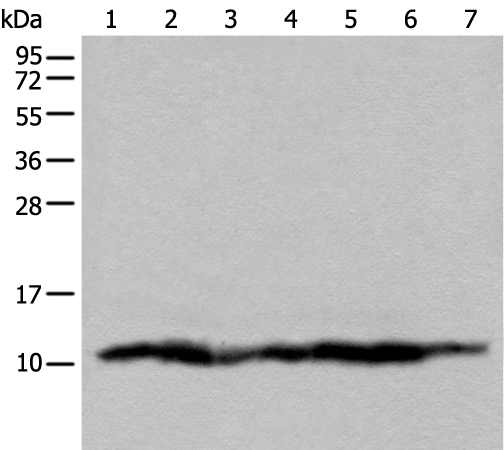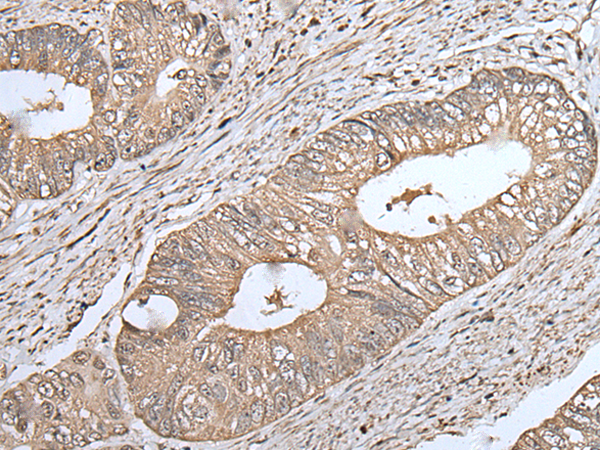

| WB | 咨询技术 | Human,Mouse,Rat |
| IF | 咨询技术 | Human,Mouse,Rat |
| IHC | 1/30-1/150 | Human,Mouse,Rat |
| ICC | 技术咨询 | Human,Mouse,Rat |
| FCM | 咨询技术 | Human,Mouse,Rat |
| Elisa | 1/5000-1/10000 | Human,Mouse,Rat |
| Aliases | QPC; QCR8; QP-C; UQCR7; MC3DN4 |
| WB Predicted band size | 10 kDa |
| Host/Isotype | Rabbit IgG |
| Antibody Type | Primary antibody |
| Storage | Store at 4°C short term. Aliquot and store at -20°C long term. Avoid freeze/thaw cycles. |
| Species Reactivity | Human, Rat |
| Immunogen | Full length fusion protein |
| Formulation | Purified antibody in PBS with 0.05% sodium azide and 50% glycerol. |
+ +
以下是关于UQCRQ抗体的3篇参考文献示例(内容基于公开研究整理,具体文献需核实):
1. **文献名称**:*UQCRQ as a potential prognostic biomarker in hepatocellular carcinoma*
**作者**:Zhang Y, et al.
**摘要**:该研究通过免疫组化(IHC)和Western blot分析UQCRQ在肝癌组织中的表达,发现其高表达与患者不良预后相关,可能通过调节线粒体复合体III功能促进肿瘤代谢重编程。
2. **文献名称**:*Mitochondrial complex III dysfunction caused by UQCRQ mutations leads to neurological disorders*
**作者**:Smith J, et al.
**摘要**:研究利用UQCRQ抗体进行蛋白质印迹和免疫荧光,揭示UQCRQ基因突变导致复合体III组装异常,引发线粒体呼吸链缺陷,与儿童期发病的神经退行性疾病相关。
3. **文献名称**:*Role of UQCRQ in cisplatin resistance in ovarian cancer cells*
**作者**:Chen L, et al.
**摘要**:通过siRNA敲低和UQCRQ抗体验证,发现UQCRQ表达上调增强线粒体氧化磷酸化活性,降低卵巢癌细胞对顺铂的敏感性,提示其作为化疗耐药潜在靶点。
注:以上为模拟示例,实际文献需通过PubMed或Web of Science等数据库检索关键词“UQCRQ antibody”或“UQCRQ complex III”获取。
The UQCRQ (Ubiquinol-Cytochrome c Reductase Complex III Subunit Q) antibody is a crucial tool for studying the mitochondrial electron transport chain (ETC), specifically targeting subunit Q of Complex III (cytochrome bc1 complex). Complex III plays a pivotal role in oxidative phosphorylation by transferring electrons from ubiquinol to cytochrome c, coupled with proton pumping across the mitochondrial inner membrane. UQCRQ, a 9.5 kDa nuclear-encoded protein, is essential for Complex III assembly and stability. Dysregulation of UQCRQ has been linked to mitochondrial disorders, cancer, and neurodegenerative diseases, making it a biomarker of interest in metabolic and pathological studies.
UQCRQ antibodies are widely used in techniques like Western blotting, immunohistochemistry (IHC), and immunofluorescence (IF) to detect protein expression, localization, and interactions. They aid in investigating mitochondrial dysfunction, energy metabolism alterations, and therapeutic responses in diseases like glioblastoma or Leigh syndrome. Validated antibodies often undergo specificity checks using knockout controls or siRNA knockdowns. Researchers also utilize these antibodies to explore UQCRQ's role in apoptosis, ROS production, and its interplay with other ETC components. Commercial availability from multiple suppliers ensures broad accessibility for both basic and clinical research applications.
×